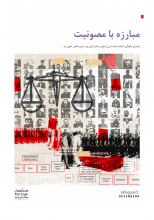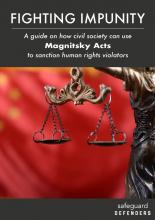A guide on using Magnitsky sanctions now out for Iran
A joint release wth Justice4Iran.
Persian speakers now have access to a guide on how to ask different countries to put human rights violators on their sanction lists, tailor-made for Iranian victims of grave human rights abuses and civil society activists.
To advance its goal of accountability, Justice for Iran has developed a guide to the effective use of Magnitsky law for Iranian civil society in Persian based on Fighting Impunity; A Guide on How Civil Society Can Use Magnitsky Laws to Sanction Human Rights Violators produced by Safeguard Defenders.

The guide is a collection of five sections. In addition to explaining the basics of Magnitsky laws, it includes methods of identifying human rights violators and gathering information required by the authorities to enlist them for sanctions.
“The guide opens a previously closed window to justice for those whose rights have been violated and gives them the freedom to seek truth and accountability. It is an important and ground-breaking tool in Iran’s human rights sphere,” says Shadi Sadr, Justice for Iran’s executive director.
For the past 43 years, the Islamic Republic of Iran’s officials have enjoyed total impunity despite their direct involvement in widespread and serious human rights abuses. Hence, human rights organisations, including Justice for Iran, have consistently sought to use international mechanisms, such as the Magnitsky laws, to hold individuals and institutions involved in human rights abuses accountable.
Magnitsky laws are powerful tools that allow governments to sanction individuals, organisations, and companies outside their jurisdiction for serious human rights abuses and corruption. Depending on the judicial system of the countries, these sanctions may include the seizure of property and travel bans.

The English language guide, focused on China and Hong Kong SAR is available here, and a companion piece, a brief guide, developed with private investigators and corporate due diligence officials, focused on China and Hong Kong, is available here.
Safeguard Defenders have also worked with local partners to develop a Vietnamese edition, and the guide is also available in Simplified Chinese. A Tibetan language edition is soon to be released.
